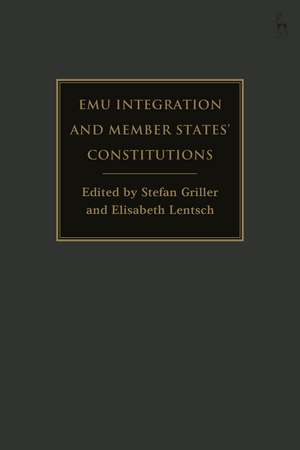EMU Integration and Member States’ Constitutions
Editat de Stefan Griller, Elisabeth Lentschen Limba Engleză Paperback – 19 oct 2022
| Toate formatele și edițiile | Preț | Express |
|---|---|---|
| Paperback (1) | 509.72 lei 6-8 săpt. | +122.94 lei 4-10 zile |
| Bloomsbury Publishing – 19 oct 2022 | 509.72 lei 6-8 săpt. | +122.94 lei 4-10 zile |
| Hardback (1) | 1080.84 lei 6-8 săpt. | |
| Bloomsbury Publishing – 24 feb 2021 | 1080.84 lei 6-8 săpt. |
Preț: 509.72 lei
Preț vechi: 695.47 lei
-27% Nou
Puncte Express: 765
Preț estimativ în valută:
97.62€ • 100.58$ • 81.78£
97.62€ • 100.58$ • 81.78£
Carte tipărită la comandă
Livrare economică 24 februarie-10 martie
Livrare express 17-23 ianuarie pentru 132.93 lei
Preluare comenzi: 021 569.72.76
Specificații
ISBN-13: 9781509948789
ISBN-10: 1509948783
Pagini: 728
Dimensiuni: 169 x 244 x 44 mm
Greutate: 1.13 kg
Editura: Bloomsbury Publishing
Colecția Hart Publishing
Locul publicării:London, United Kingdom
ISBN-10: 1509948783
Pagini: 728
Dimensiuni: 169 x 244 x 44 mm
Greutate: 1.13 kg
Editura: Bloomsbury Publishing
Colecția Hart Publishing
Locul publicării:London, United Kingdom
Caracteristici
Distinguished legal scholars from the EU Member States (plus the UK) analyse the development of the EU Member States' attitudes to economic, fiscal, and monetary integration since the Treaty of Maastricht
Notă biografică
Stefan Griller is Professor of European Law at the University of Salzburg, Austria.Elisabeth Lentsch worked at the University of Salzburg, Austria.
Cuprins
1. Analytical Report on the Legal Background of Member States' Positions towards Economic and Fiscal Integration Stefan Griller, University of Salzburg, Austria 2. EMU Integration against the Backdrop of EU Law and Jurisprudence Elisabeth Lentsch, formerly of Horizon 2020 Project 3. Bulgaria: EMU Integration and the Bulgarian Constitution: 'Missing Constitution' or EU Friendliness and Open Statehood Masquerading Implicit Sovereigntist Strategies in the Context of Multilevel Constitutional Games? Martin Belov, St Kliment Ochridski University of Sofia, Bulgaria4. EMU Integration and the Czech Constitution: Doctrinal Openness and Political Reluctance Tomas Dumbrovsky, Charles University Prague, Czech Republic 5. DenmarkUlla Neergaard, University of Copenhagen, Denmark6. Germany Stefan Korioth, Ludwig Maximilians University Munich, Germany, and Jonas Marx, Ludwig Maximilians University Munich, Germany7. Estonia Andres Tupits, Estonian Business School, Tallinn, Estonia8. Ireland Gavin Barrett, University College Dublin, Ireland9. Greece: Further EMU Steps Require a Democratic Eurozone Architecture Lina Papadopoulou, Aristotle University, Salonica, Greece10. Spain: The Impact of the EMU on the Spanish Constitution Following the Euro Crisis: A Stress Test for the Europeanisation of the Constitutional Order Diane Fromage, University of Maastricht, the Netherlands, Maribel Gonzalez Pascual, Secretary of State for Territorial Policy of the Spanish Government, Madrid, Spain, Joan Solanes Mullor, Pompeu Fabra University, Barcelona, Spain and Aida Torres Perez, Pompeu Fabra University, Barcelona, Spain11. France: The Paradox of Constitutional Adaptability in a Member State Running Budget Excessive Deficits Laetitia Guilloud-Colliat, Université Grenoble-Alpes, Grenoble, France and Fabien Terpan, Science Po Grenoble, France12. Croatia Tamara Capeta, University of Zagreb, Croatia and Iris Goldner Lang, University of Zagreb, Croatia13. Italy Monica Bonini, Bicocca University, Milan, Italy, and Stefania Ninatti, Department of Bicocca University, Milan, Italy14. Cyprus Nikos Skoutaris, University of East Anglia, UK15. Latvia Dita Plepa, Riga Stradins University, Riga, Latvia16. Lithuania Irmantas Jarukaitis, Court of Justice of the EU in Luxembourg17. Luxembourg Jorg Gerkrath, University of Luxembourg18. Hungary Attila Vincze, Andrássy University Budapest, Hungary, Pal Sonnevend, Eötvös Lórant University ELTE in Budapest, Hungary and Andras Jakab, University of Salzburg, Austria19. Malta: The Assimilation of the EU's Economic, Fiscal and Monetary Governance Acquis in the Maltese Legal Framework Joseph Bugeja, Gauci-Maistre Xynou in La Valetta, Malta20. The Netherlands Jan-Herman Reestman, University of Amsterdam, the Netherlands and Monica Claes, Maastricht University, the Netherlands21. Austria Rainer Palmstorfer, University of Salzburg, Austria22. Poland Dariusz Adamski, University of Wroclaw, Poland23. Portugal Ana Maria Guerra Martins, European Court of Human Rights, Strasbourg, France and Joana de Sousa Loureiro, Centre for Judicial Studies in Lisbon, Portugal24. Romania Dr Mihaela Vrabie, University of Bucharest, Romania25. Slovakia: (Seemingly) No Legal Obstacles to Deepening EMU Integration Robert Zbiral, Masaryk University in Brno, Czech Republic26. Slovenia Matej Avbelj, Graduate School of Government and European Studies at Kranj, Slovenia and Erazem Bohinc, Higher Court in Ljubljana, Slovenia27. Finland Tuomas Ojanen, University of Helsinki, Finland28. Sweden Joakim Nergelius, Örebro University, Sweden and Eleonor Kristoffersson, Örebro University, Sweden29. United Kingdom Paul Craig, University of Oxford, UK
